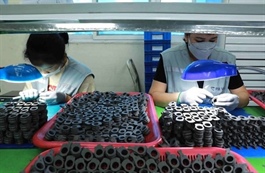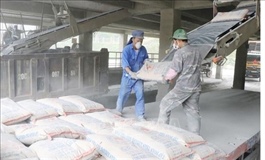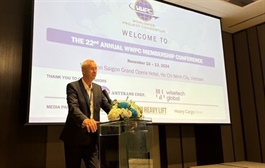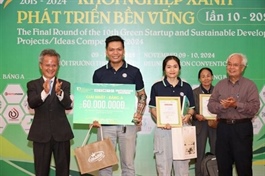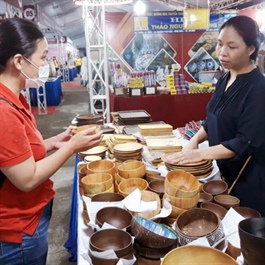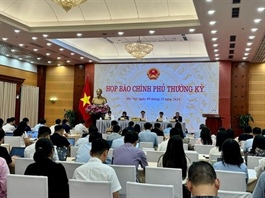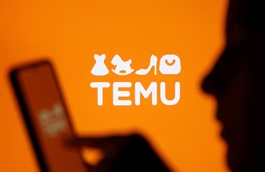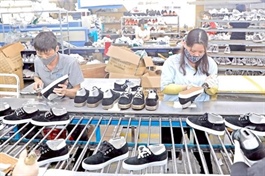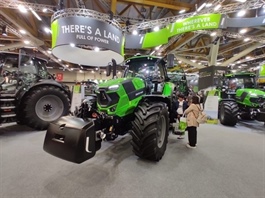Sustainability will help VN exporters gain competitive edge in Europe: workshop
Sustainability will help VN exporters gain competitive edge in Europe: workshop
Meeting green standards is no longer optional but it is now a key requirement for Vietnamese businesses to maintain and expand access to the EU market, a workshop heard in HCM City on November 13.
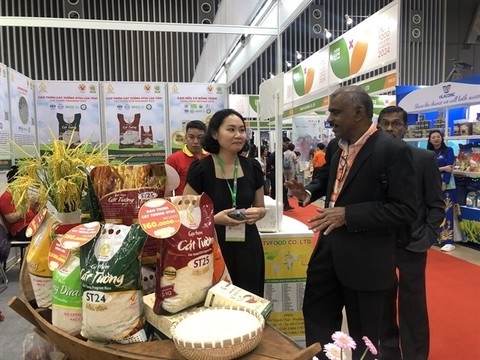
Lê Hoàng Tài, deputy general director of the Việt Nam Trade Promotion Agency, speaks at the Green Transition in Agricultural Production and Food, Promoting Exports to the EuropeanUnion in HCM City on November 13. — VNS Photo |
Speaking at the workshop Green Transition in Agricultural Production and Food, Promoting Exports to the EU, Jean-Jacques Bouflet, vice chair in charge of advocacy at the European Chamber of Commerce in Vietnam (EuroCham), said the EU’s Green Deal sets an agenda for a sustainable future.
Central to this are policies such as the “Farm to Fork Strategy” and the EU Deforestation Regulation, he said.
Compliance with these regulations is mandatory but also offers Vietnamese businesses a valuable opportunity to integrate further into the global supply chain, he said.
“To align with these evolving standards, businesses must first focus on enhancing sustainability in their production processes.”
Another crucial step is obtaining internationally recognised certifications for good agricultural practices, environmentally friendly farming and social responsibility, he said.
“These certifications not only open doors to the European market but also build trust and confidence among buyers and consumers, who are more conscious than ever about the origins and sustainability of the products they purchase.”
The EU places great emphasis on transparency and traceability across the supply chain, and Vietnamese enterprises must establish robust systems that enable them to track their products from farm to fork, he claimed.
Leveraging modern technologies such as blockchain can enhance this traceability, ensuring that every stage of the production process is transparent, which is particularly important under the Deforestation-Free Products Regulation, where proof of sustainable sourcing is mandatory, he said.

Foreign trade visitors visit Foodexpo 2024 that is being held at the Saigon Exhibition and Convention Centre in HCM City to seek supply sources. Meeting green standards is no longer optional but a key requirement for Vietnamese businesses to maintain and expand access to the EU market. —VNS Photo |
He called on Vietnamese businesses to prepare for future requirements related to carbon reporting, saying that, while the EU’s CBAM currently targets industrial sectors, it is likely to expand to agriculture in future.
While the challenges posed by these new green standards are significant, they also present an “incredible opportunity,” he said.
“Enterprises that embrace sustainability can gain a competitive edge in the European market, where consumers are willing to pay a premium for products that align with their values.
“Beyond compliance, adopting green standards enhances brand reputation and positions Vietnamese products as leaders in sustainability, not just in Europe but globally.”
Laurent Lourdais of the EU Delegation to Việt Nam referred to the stringent standards the EU applies to imported agricultural and food products, saying Vietnamese businesses need to constantly innovate production processes, ensuring environmental and social criteria are met, to maintain a presence in the market.
He suggested that they should build sustainable supply chains and strengthen traceability to meet the growing expectations of European consumers.
Lê Hoàng Tài, deputy general director of the Việt nam Trade Promotion Agency, said the EU is one of Việt Nam's leading trade and investment partners.
He highlighted the role of the Vietnam – EU Free Trade Agreement and the EU-Việt Nam Investment Protection Agreement, which facilitate trade and investment with and technology transfer from the EU.
In the first three quarters of this year, bilateral trade topped US$50.34 billion, with Việt Nam achieving a trade surplus of $25 billion, a 20 per cent increase over the previous year.
Its agricultural exports to the EU exceeded $840 million, up 50 per cent year-on-year.
Tài also said Việt Nam is actively fulfilling its COP26 commitments and aiming for Net Zero by 2050 through the National Green Growth Strategy.
The Ministry of Industry and Trade will help businesses adopt ESG standards, promoting trade, investing in green technology, and advancing sustainable production models to enhance competitiveness and deepen integration into the global value chain.
Executives from two local firms, Vinasoy and Betrimex, spoke about their employers’ strong commitment to sustainable development through high-tech applications and resource optimisation.
Vinasoy’s investment in a zero-waste production process (Okara) has enabled it to optimise soybean use and minimise waste in plant-based milk production while meeting green standards.
Betrimex has focused on maximising the value of coconuts, minimising waste, implementing carbon offset projects, and renewable energy. The company also promotes sustainable and digitalised farming models to support farmers, aiming to increase their incomes and generally improve rural livelihoods.
These efforts not only help reduce environmental impacts but also enhance export value, strengthening the position of Vietnamese products in the international market.
The event also witnessed the signing of a memorandum of understanding between the Centre for Information Technology Application and Digital Transformation in Trade Promotion under Vietrade, Tridge (South Korea), and Vietnam Omnichannel Trade Promotion JSC for promoting the export of Vietnamese agricultural and food products through modern digital platforms.
The workshop was organised by the Ministry of Industry and Trade in collaboration with the European Commission as part of the Vietnam International Food Industry Exhibition 2024 being held in HCM City.




